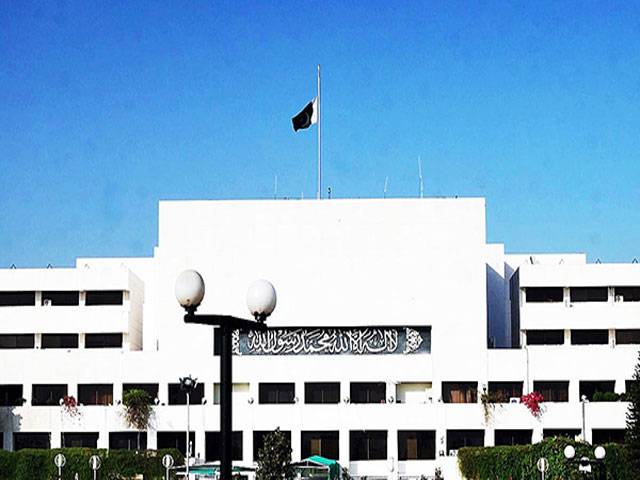ISLAMABAD - The committee system in country’s parliament has seemingly failed to yield as much as expected because the recommendations of parliamentary bodies are rarely implemented by the executive due to different reasons.
The parliamentary committees around the world monitor the government operations, identify critical issues, collect and assess information and suggest solutions or guidelines for the legislative bodies.
Several members of the Senate and National Assembly committees are of the view that these bodies have lost purpose and now they are just a convenient means to accommodate ‘friends’, who enjoy different perks and preferential treatment – a view not shared by all members and chairmen of those committees.
“We can only recommend and that we have been doing regularly. Unfortunately, the democratic governments have been more dictatorial. During the so-called dictatorship (of Pervez Musharraf), some 80-90 percent of the parliament’s standing committees’ recommendations were taken seriously, a ratio that has considerably dropped,” Senator Kamil Ali Agha told The Nation.
Agha, who chairs Senate Committee on Information, Broadcasting and National Heritage, said, “The committees have members from various parties (from both sides of the aisle) and the recommendations are mostly very appealing and implementable. The government must take their proposals seriously and act accordingly.”
“My committee had made two important recommendations – one on code of conduct for the electronic media and the other on the right to information. We consulted the government and they were happy with these proposals but we are still waiting for any action,” Senator Agha said.
The recommendations can be brought in the house as private bills, he said, but “we have been requesting the government to introduce them as treasury bills so that there is a smooth sailing”. The veteran politician said he is consulting his friends to move a resolution in the house against this government attitude. He said, “If we can’t improve things, the (committees’) meetings will be a futile exercise. Our meetings should bear fruits.”
Siraj Mohammed Khan, chairman of National Assembly’s standing committee on commerce and textiles, said, “We try to give good proposals but normally the government is not able to translate them (into action)... I think the government wants to take action but lacks resources sometimes. We are doing our job but, of course, it will be good that they implement our decisions.”
The politician from Nowshera said, “Everything goes slow in Pakistan. There are more issues than we can handle. We want to improve trade and have been holding meetings with the businessmen in this regard.” He said sometimes their demands are too idealistic which is too hard for the government to meet. “Our demands (with respect to trade and commerce) mostly reflect idealistic approach. The government has to think of other sectors too”, he added.
Khan said the standing committee on commerce has made so many recommendations in the recent months but “most of them have been denied attention”. “Our proposals are aimed at industrialisation which will create jobs and open gates for investment”, he said. He however said the government should give importance to the proposals of the standing committees as “(difficult) practical steps need to be taken for the development of the country”.
NA defence committee chairman Sheikh Rohail Asghar said that it is not mandatory for the government to take action on the recommendations of the standing committees. “We don’t take decisions, we make recommendations. The government takes action on some and leave others for the future consideration. We cannot expect the government to implement all our proposals”, Asghar said.
“Our committee gave a proposal for submarines recently and it was accepted. The government accepted our recommendations and agreed to buy 8 submarines from China”, he recalled. “Some recommendations can be easily accepted while others take time. Even the government can’t implement all its plans, how can a parliamentary body expect this”, he added. Rohail Asghar said it is unfair to call the standing committees as ineffective. “They are all doing their job which is very important in a democratic set-up”, he added.
In any parliamentary system the committees play an effective role in the smooth running of legislative bodies. Individuals who are members of such committees become aware of all the intricate workings and day to day operations of such bodies, and develop expert knowledge.
The committees are essentially fact finding, consensus building and policy recommending boards that seek to fulfil the demands of the citizens. They form a link between the parliament, the executive and the general public. Although there are dozens of committees in the parliament at present, including standing, house, finance and functional committees, they have failed to leave their mark in any way.
“We need to empower the committees so that they can influence the government to take action and ask them why good ideas are dropped. The committee system should be effective and not become unproductive in any case”, Kamil Ali Agha opined.
Friday, April 19, 2024
Have parliamentary committees lost purpose?
| Kamil Agha alleges govt ignores recommendations | Siraj believes lack of resources, idealistic nature of demands make implementation difficult | Rohail Asghar says committees’ recommendations not binding

12:00 PM | April 19, 2024
Polling begins in first phase of India’s marathon general elections
3:31 PM | April 19, 2024
UNICEF to provide $20m for youth projects in Pakistan
2:04 PM | April 19, 2024
Maryam reviews progress on Nawaz Sharif IT City project in Lahore
2:04 PM | April 19, 2024
Pakistan, Saudi Arabia vow to solidify efforts in defence collaboration
1:38 PM | April 19, 2024
Minister reviews naan, roti prices
April 19, 2024
A Tense Neighbourhood
April 19, 2024
Dubai Underwater
April 19, 2024
X Debate Continues
April 19, 2024
Hepatitis Challenge
April 18, 2024
IMF Predictions
April 18, 2024
Kite tragedy
April 19, 2024
Discipline dilemma
April 19, 2024
Urgent plea
April 19, 2024
Justice denied
April 18, 2024
AI dilemmas unveiled
April 18, 2024
ePaper - Nawaiwaqt
Advertisement
Nawaiwaqt Group | Copyright © 2024





